Los Angeles, CA – Today, the Neilsen Foundation, the largest private funder of spinal cord injury (SCI) research, education, clinical training, and programmatic support in the U.S. and Canada, announced the recipients of the 2022 Craig H. Neilsen Visionary Prize. This year’s Visionary Prize celebrates Yannick Benjamin (New York City), Joshua Basile, Esq. (Washington, DC), and Dr. Oluwaferanmi “Feranmi” Okanlami (Ann Arbor, Michigan), three trailblazers who honor Craig H. Neilsen and his legacy through their values and work ethic.
Craig H. Neilsen overcame barriers during his lifetime and empowered others to do the same. Prize recipients reflect many of the ideals important to Mr. Neilsen during his lifetime: they are unafraid to take bold risks, possess boundless determination and passion, and can inspire others. Established in 2020, the Visionary Prize is awarded annually to important voices whose contributions have improved the lives of those affected by SCI.
“The Neilsen Foundation is honored to award Yannick, Joshua, and Feranmi the 2022 Visionary Prize,” said Kym Eisner, Executive Director of the Neilsen Foundation. “These three individuals exemplify the values of the Neilsen Foundation and the dedication our founder had to enrich the lives of people living with SCI. They have already made an extraordinary mark in their efforts to change the world for the better and we can’t wait to see what they do next.”
“My father would be so proud to see the influential contributions of Yannick, Joshua, and Feranmi,” said Ray Neilsen, Co-Trustee & Chairman of the Board. “The Visionary Prize reflects my father’s extraordinary determination, inexhaustible passion, and ability to inspire those around him. We look forward to following this year’s incredible awardees as they continue with their impressive careers.”
Yannick Benjamin is a New York City-based sommelier and proprietor of Contento, a restaurant in East Harlem committed to accessibility for all. In 2003, a car accident left Mr. Benjamin paralyzed but that did not stop him from pursuing his dreams of attending college and becoming a world-class sommelier. He is currently an Advanced Sommelier with the Court of Master Sommeliers, actively working at the University Club, and he has also been employed at Le Du’s Wines for over seven years.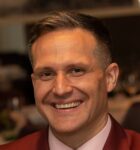
As the cofounder of Wheeling Forward, a powerhouse nonprofit driving progress in the disability community, Yannick has worked tirelessly to bring awareness and visibility to seldom-heard voices in the wine industry and to champion inclusivity. He brings his energy and passion to East Harlem, where he has realized his dream as the co-owner of Contento.
As a para-athlete, Mr. Benjamin also competed in several races, including the New York, Boston, and Chicago marathons. His deep connections in the wine world have helped Wheeling Forward build a broad base of supporters and inspired many sommeliers and wine distributors to give back to the community.
Joshua Basile, Esq. is a DC-based attorney, Founder of Determined2Heal and SPINALpedia, and Community Relations Manager of accessiBe. Joshua decided to pursue a legal career to help and fight for the catastrophically injured after suffering his own traumatic injury in 2004. Mr. Basile’s life changed forever during a family vacation when he suffered a severe spinal cord injury resulting in permanent paralysis. As a quadriplegic, he knows firsthand the daily struggles of the catastrophically injured and the importance of improving one’s quality of life.
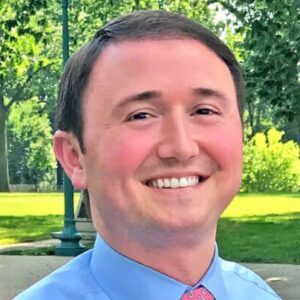 After graduating magna cum laude from law school and passing the Maryland and District of Columbia bar, Mr. Basile joined Jack H. Olender & Associates. He also cofounded SPINALpedia.com, an online social mentoring website that allows the spinal cord community to motivate each other. In 2019, Mr. Basile was inducted into the National Disability Mentoring Coalition’s Susan Daniels Mentoring Hall of Fame. His competitive attitude also continues outside of his legal career; he is an inventor of both a device and a sport. He holds a patent for a golf device he created that allows those with physical limitations to putt a ball anywhere on a green or a miniature golf course. His putting device is used in Slingshot Golf, the sport he created, which allows participants of all abilities to play against each other. Josh is also one of the driving forces behind accessiBe’s non-profit initiative accessFind, the world’s first search engine for accessible websites.
After graduating magna cum laude from law school and passing the Maryland and District of Columbia bar, Mr. Basile joined Jack H. Olender & Associates. He also cofounded SPINALpedia.com, an online social mentoring website that allows the spinal cord community to motivate each other. In 2019, Mr. Basile was inducted into the National Disability Mentoring Coalition’s Susan Daniels Mentoring Hall of Fame. His competitive attitude also continues outside of his legal career; he is an inventor of both a device and a sport. He holds a patent for a golf device he created that allows those with physical limitations to putt a ball anywhere on a green or a miniature golf course. His putting device is used in Slingshot Golf, the sport he created, which allows participants of all abilities to play against each other. Josh is also one of the driving forces behind accessiBe’s non-profit initiative accessFind, the world’s first search engine for accessible websites.
Dr. Oluwaferanmi “Feranmi” Okanlami is an Assistant Professor of Family Medicine with a joint appointment in the Department of Physical Medicine and Rehabilitation at the University of Michigan. He serves as the Director for Medical Student Success in the Office for Health Equity and Inclusion and in 2021, was named the Director of Student Accessibility and Accommodation Services. Born in Nigeria before immigrating to the U.S. at a young age, Dr. Okanlami earned a master’s degree in Engineering, Science, and Technology Entrepreneurship from The University of Notre Dame, and completed his Family Medicine Residency at Memorial Hospital in South Bend, Indiana. Feranmi received his MD from the University of Michigan before matching into Yale University’s Orthopedic Surgery Residency Program.
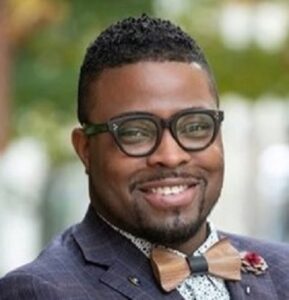 At the beginning of his third year at Yale, he suffered a spinal cord injury, paralyzing him from the chest down. After two surgeries and intense rehabilitation, he regained some motor function. Nationally, Dr. Okanlami serves as the Disability Issues representative on the Steering Committee for the Group on Diversity and Inclusion at the Association of American Medical Colleges, while sitting on the National Medical Association’s Council on Medical Legislation. He was also selected by the White House Office of Public Engagement to participate in the Health Equity Leaders Roundtable Series and was honored with one of Michiana’s 2017 Forty Under 40 awards. Dr. O, as he is affectionately known, has a catchphrase “Disabusing Disability,” which he uses to demonstrate that DISability doesn’t necessarily mean INability, and serves the goal of creating a health system that is both inclusive and accessible for all. In 2020, he stepped up as the faculty lead for the COVID-19 hotline for the University of Michigan and was appointed to the COVID Campus Response Committee. He also serves on the Council for Medical Legislation at the National Medical Association.
At the beginning of his third year at Yale, he suffered a spinal cord injury, paralyzing him from the chest down. After two surgeries and intense rehabilitation, he regained some motor function. Nationally, Dr. Okanlami serves as the Disability Issues representative on the Steering Committee for the Group on Diversity and Inclusion at the Association of American Medical Colleges, while sitting on the National Medical Association’s Council on Medical Legislation. He was also selected by the White House Office of Public Engagement to participate in the Health Equity Leaders Roundtable Series and was honored with one of Michiana’s 2017 Forty Under 40 awards. Dr. O, as he is affectionately known, has a catchphrase “Disabusing Disability,” which he uses to demonstrate that DISability doesn’t necessarily mean INability, and serves the goal of creating a health system that is both inclusive and accessible for all. In 2020, he stepped up as the faculty lead for the COVID-19 hotline for the University of Michigan and was appointed to the COVID Campus Response Committee. He also serves on the Council for Medical Legislation at the National Medical Association.
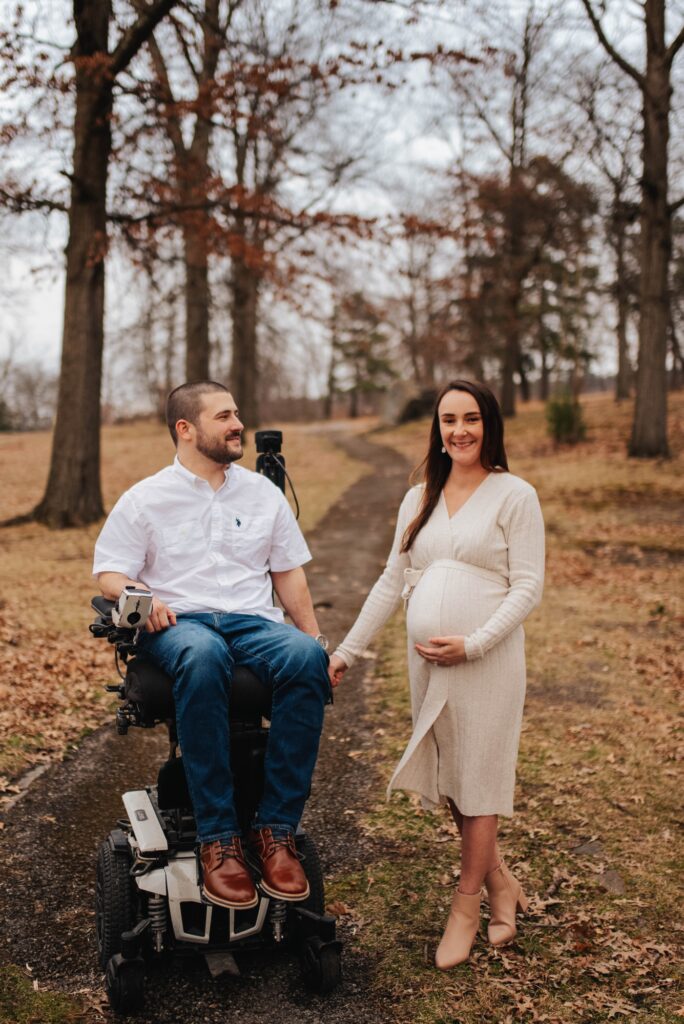 Love is in the air and Valentine’s Day is an annual reminder for us to celebrate romance, friendship, connection, admiration, sexuality, and reproductive wellbeing— none of which end with a spinal cord injury (SCI).
Love is in the air and Valentine’s Day is an annual reminder for us to celebrate romance, friendship, connection, admiration, sexuality, and reproductive wellbeing— none of which end with a spinal cord injury (SCI).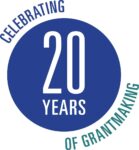
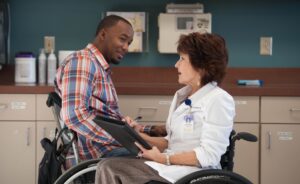 Supplements to encourage and support undergraduate and/or graduate students from groups that are historically underrepresented in the biomedical, clinical, and social sciences.
Supplements to encourage and support undergraduate and/or graduate students from groups that are historically underrepresented in the biomedical, clinical, and social sciences.

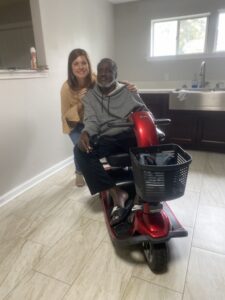
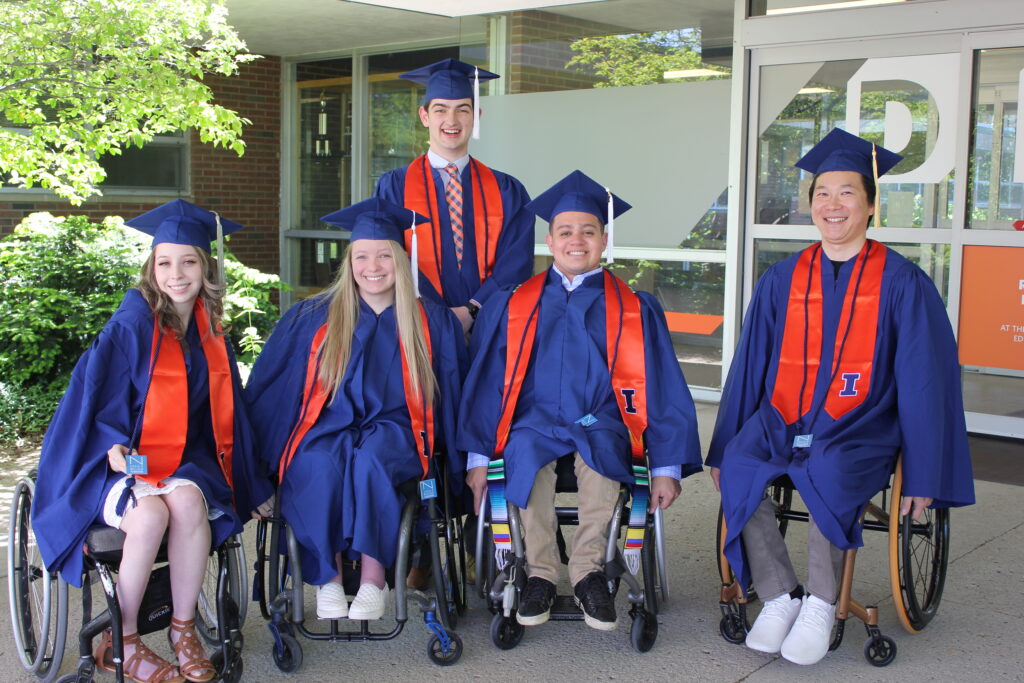

 After graduating magna cum laude from law school and passing the Maryland and District of Columbia bar, Mr. Basile joined Jack H. Olender & Associates. He also cofounded SPINALpedia.com, an online social mentoring website that allows the spinal cord community to motivate each other. In 2019, Mr. Basile was inducted into the National Disability Mentoring Coalition’s Susan Daniels Mentoring Hall of Fame. His competitive attitude also continues outside of his legal career; he is an inventor of both a device and a sport. He holds a patent for a golf device he created that allows those with physical limitations to putt a ball anywhere on a green or a miniature golf course. His putting device is used in Slingshot Golf, the sport he created, which allows participants of all abilities to play against each other. Josh is also one of the driving forces behind accessiBe’s non-profit initiative accessFind, the world’s first search engine for accessible websites.
After graduating magna cum laude from law school and passing the Maryland and District of Columbia bar, Mr. Basile joined Jack H. Olender & Associates. He also cofounded SPINALpedia.com, an online social mentoring website that allows the spinal cord community to motivate each other. In 2019, Mr. Basile was inducted into the National Disability Mentoring Coalition’s Susan Daniels Mentoring Hall of Fame. His competitive attitude also continues outside of his legal career; he is an inventor of both a device and a sport. He holds a patent for a golf device he created that allows those with physical limitations to putt a ball anywhere on a green or a miniature golf course. His putting device is used in Slingshot Golf, the sport he created, which allows participants of all abilities to play against each other. Josh is also one of the driving forces behind accessiBe’s non-profit initiative accessFind, the world’s first search engine for accessible websites. At the beginning of his third year at Yale, he suffered a spinal cord injury, paralyzing him from the chest down. After two surgeries and intense rehabilitation, he regained some motor function. Nationally, Dr. Okanlami serves as the Disability Issues representative on the Steering Committee for the Group on Diversity and Inclusion at the Association of American Medical Colleges, while sitting on the National Medical Association’s Council on Medical Legislation. He was also selected by the White House Office of Public Engagement to participate in the Health Equity Leaders Roundtable Series and was honored with one of Michiana’s 2017 Forty Under 40 awards. Dr. O, as he is affectionately known, has a catchphrase “Disabusing Disability,” which he uses to demonstrate that DISability doesn’t necessarily mean INability, and serves the goal of creating a health system that is both inclusive and accessible for all. In 2020, he stepped up as the faculty lead for the COVID-19 hotline for the University of Michigan and was appointed to the COVID Campus Response Committee. He also serves on the Council for Medical Legislation at the National Medical Association.
At the beginning of his third year at Yale, he suffered a spinal cord injury, paralyzing him from the chest down. After two surgeries and intense rehabilitation, he regained some motor function. Nationally, Dr. Okanlami serves as the Disability Issues representative on the Steering Committee for the Group on Diversity and Inclusion at the Association of American Medical Colleges, while sitting on the National Medical Association’s Council on Medical Legislation. He was also selected by the White House Office of Public Engagement to participate in the Health Equity Leaders Roundtable Series and was honored with one of Michiana’s 2017 Forty Under 40 awards. Dr. O, as he is affectionately known, has a catchphrase “Disabusing Disability,” which he uses to demonstrate that DISability doesn’t necessarily mean INability, and serves the goal of creating a health system that is both inclusive and accessible for all. In 2020, he stepped up as the faculty lead for the COVID-19 hotline for the University of Michigan and was appointed to the COVID Campus Response Committee. He also serves on the Council for Medical Legislation at the National Medical Association.